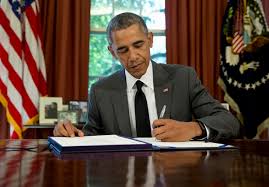Obama’s Defense Of Gay Discharges Contradicted By Use Of Signing Statements
Exercises Executive Power Five Times While Claiming No Authority to End Gay Firings
SANTA BARBARA, CA, – President Barack Obama’s use of signing statements—a presidential authorization to ignore portions of Congressional law—is being criticized by scholars who study gay rights for directly contradicting his defense of ongoing gay troop discharges. The President has refused to intervene to stop the firing of gay troops, citing the rationale that the White House should not be “simply ignoring a Congressional law.” Last month the President told Anderson Cooper of CNN that “it’s not appropriate for the executive branch simply to say, ‘we will not enforce a law.’”
But yesterday’s New York Times reports that the President has used signing statements five times to challenge nineteen provisions of federal statute, including a law restricting the use of U.S. troops in United Nations commands. According to Dr. Aaron Belkin, Director of the Palm Center at the University of California, Santa Barbara, the President’s use of signing statements to ignore provisions of standing law is a far more flagrant assertion of executive authority than would be an executive order halting gay discharges. “Contrary to what some have stated,” said Belkin, “using executive power to suspend the gay ban is not questionable or even controversial among major legal scholars. It is a power explicitly granted to the President by Congress under the ‘stop-loss’ statute.” By contrast, Belkin said, signing statements are a controversial use of executive authority that many, such as the American Bar Association, have called unconstitutional for usurping Congressional authority.
Diane Mazur, Professor of Law at the University of Florida Levin College of Law, agreed. “There’s a total inconsistency to the logic here,” said Mazur, who is an affiliated scholar at the Palm Center. “How can you exercise questionable executive authority with a signing statement while declaring that using a Congressionally-granted power to let gays serve is illegal?”
The idea of ending the gay ban by executive order first gained momentum after the release in May of a Palm Center study showing that the president has the authority to suspend “don’t ask, don’t tell” under a Congressional “stop-loss” statute (10 U.S.C. § 12305). Since then, gay groups and politicos have debated the political merits of taking such action, but no one has shown the step would be illegal.
